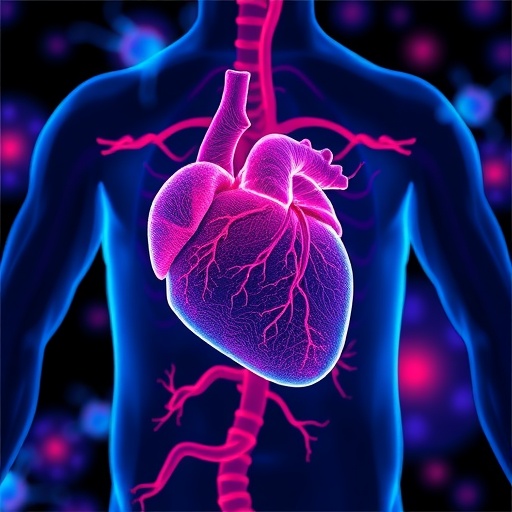In recent years, researchers have increasingly acknowledged the intricate relationship between the gut microbiota and various physiological processes, particularly pertaining to cardiovascular health. One of the most compelling areas of study is how dysbiosis, or an imbalance in the microbiome, can exacerbate conditions such as heart failure. A paper by Zhang et al. delves into this vital connection, offering insights that could reshape our understanding of heart failure treatment. This research highlights the pivotal role that the lipopolysaccharide (LPS) – Toll-like receptor 4 (TLR4) – nuclear factor kappa-light-chain-enhancer of activated B cells (NF-κB) signaling pathway plays in mediating the effects of gut microbiota on heart health.
The body’s microbiome is a complex ecosystem, teeming with trillions of microorganisms that play essential roles in maintaining health. However, this delicate balance can be disrupted, leading to dysbiosis, which has been linked to numerous health issues beyond the gut itself, including obesity, diabetes, and cardiovascular diseases. The new findings by Zhang and colleagues suggest that the gut microbiota not only has a role in the regulation of metabolic processes but is also crucial in how the body responds to heart failure.
Heart failure is a leading cause of morbidity and mortality worldwide, characterized by the heart’s inability to pump sufficiently to maintain blood flow to meet the body’s needs. Traditional treatment strategies focus primarily on the cardiovascular system, often overlooking the critical interplay between the heart and the microbiome. By illuminating the mechanistic insights into this relationship, Zhang et al. provide a vital piece of the puzzle that could lead to innovative therapies.
The LPS-TLR4 signaling pathway is a key player in the immune response, and dysregulation here can trigger a cascade of inflammatory activities that worsen heart failure. LPS, a component of bacterial cell walls, can induce strong immune responses. When TLR4, a receptor on immune cells, recognizes LPS, it triggers the NF-κB signaling pathway, leading to the expression of pro-inflammatory cytokines and contributing to cardiac inflammation and dysfunction. Understanding this pathway enables researchers to see how an imbalance in gut bacteria can lead to the toll on heart health.
Zhang’s research corroborates previous studies suggesting that microbial metabolites can influence cardiomyocyte function and overall heart performance. Among these metabolites, short-chain fatty acids (SCFAs) produced by the fermentation of dietary fibers in the gut have garnered interest for their protective effects against heart failure. They can modulate inflammation, promote insulin sensitivity, and improve endothelial function. The researchers propose that correcting dysbiosis may lead to improved generation of these beneficial metabolites, ultimately benefiting heart function.
Moreover, the results of the study indicate potential therapeutic strategies targeting TLR4 inhibition as a means of countering the adverse effects of gut microbiota dysbiosis on heart health. With the use of TLR4 antagonists or inhibitors, it may be possible to mitigate the inflammatory responses that exacerbate heart failure. This represents a promising avenue for treatment, as current therapies primarily focus on managing symptoms rather than addressing the underlying causes.
Additionally, the researchers emphasize the importance of diet in shaping the microbiome and, consequently, heart health. A balanced diet rich in fiber, probiotics, and prebiotics can foster a healthy gut microbiota, potentially reducing the risk of heart failure. Interventions aimed at dietary changes could be a simple yet effective complement to pharmacological treatments, providing an added layer of protection against heart failure.
The findings from Zhang et al. contribute to a growing body of literature that seeks to interconnect microbiology with cardiology, reshaping how we view chronic diseases and their treatments. By highlighting the gut-heart axis, this research opens up new possibilities for multidimensional therapeutic approaches that are more holistic and comprehensive.
As the study calls for further exploration, the implications extend beyond heart failure alone. Understanding how gut microbiota communicates with the immune system and other body processes could yield insights into a range of cardiovascular diseases and conditions. Future research may focus on developing personalized approaches, where microbiome assessments guide therapeutic decisions tailored to individual patients.
Overall, this study serves as a compelling reminder of the complexity of human health and the interplay of various systems within the body. Emphasizing the gut microbiota’s role in impacting cardiovascular health and the underlying signaling pathways involved can lead to groundbreaking new therapies that reach beyond the confines of traditional medicine.
In conclusion, the work of Zhang and colleagues offers a profound perspective on how we approach heart failure treatment. It emphasizes the need for a holistic understanding of health that goes beyond mere symptom management and seeks to rectify underlying imbalances contributing to disease. The journey towards refining our therapeutic landscape may well lie in this innovative intersection of microbiome research and cardiovascular care.
Subject of Research: The connection between gut microbiota dysbiosis and heart failure exacerbation.
Article Title: Correction: Gut microbiota dysbiosis exacerbates heart failure by the LPS-TLR4/NF-κB signalling axis: mechanistic insights and therapeutic potential of TLR4 inhibition.
Article References:
Zhang, C., Teng, X., Cao, Q. et al. Correction: Gut microbiota dysbiosis exacerbates heart failure by the LPS-TLR4/NF-κB signalling axis: mechanistic insights and therapeutic potential of TLR4 inhibition. J Transl Med 23, 954 (2025). https://doi.org/10.1186/s12967-025-06943-z
Image Credits: AI Generated
DOI:
Keywords: Gut microbiota, heart failure, dysbiosis, inflammation, TLR4, NF-κB, SCFAs, microbiome, therapeutic potential, cardiovascular health.
Tags: cardiovascular disease and microbiome linkdysbiosis and heart failuregut health and heart diseasegut microbiota and cardiovascular healthheart failure treatment insightsimplications of dysbiosis on healthLPS-TLR4 signaling pathwaymicrobiome and metabolic regulationmicrobiome imbalance effectsNF-κB in heart failureresearch on gut dysbiosis and heart healthrole of gut microbiota in metabolism





